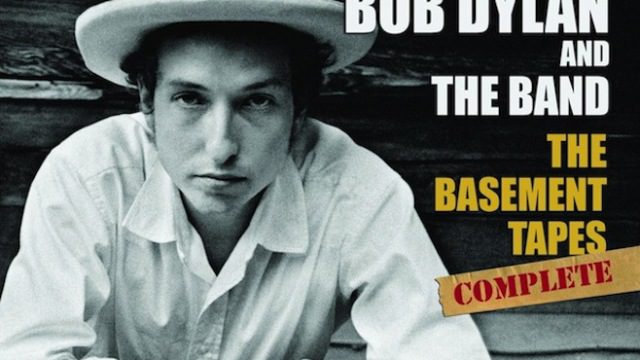In the mid-1960s, Bob Dylan was recovering from a motorcycle accident that nearly killed him, and the music world was recovering from the A-bomb that he dropped on the folk scene with “Like a Rolling Stone.” It was time for a break, so Dylan retreated to upstate New York with his backing band The Hawks (later renamed The Band), and they recorded over a hundred tracks of blues, folk, bluegrass, country, covers, and even some novelty tracks. True to Dylan’s elusive nature, none of these songs saw the light of day until 1974, when a fraction of them were released as The Basement Tapes, a revelatory collection of music that gave rise to not only the advent of alt-country, but the career of The Band.
So the lingering question for the better part of forty years has been, When are we going to hear everything that didn’t come out? That’s a question that Bootleg Vol. 11 – The Basement Tapes Complete aims to answer. The newest installment of Dylan’s bootleg series, Basement Tapes Complete is six discs and 139 songs long (there’s also a more manageable two-disc version called The Basement Tapes Raw). It’s a ludicrous amount of material, and Dylan seems to know that no listener could hope to process that much music. For having such a long, storied career, Dylan has always maintained an air of unattainable aloofness, whether it was sparring with the press in the ’60s or becoming a born-again Christian in the ’80s, and BTC is an almost comical act of transparency, as if he’s challenging us to even attempt to make heads or tails of what happened in New York forty years ago (although Dylan, ever playful, still closes the album with a song called “Confidential”).
Among the multitude of songs, you’ll find outtakes and alternate versions of tracks from The Basement Tapes: there are three versions each of “Open the Door Homer,” “Tears of Rage,” and “Nothing Was Delivered,” two versions of “Million Dollar Bash” and “Odds and Ends,” and so forth. Cover songs pop up sporadically, such as Johnny Cash’s “Folsom Prison Blues” and Hank Williams’ “You Win Again”; even Dylan mainstays like “Blowin’ in the Wind” and “It Ain’t Me, Babe” are given a makeover. There are goofy novelty songs like “See You Later Allen Ginsberg,” and early versions of tracks from 1970’s Self Portrait like “Quinn the Eskimo (The Mighty Quinn).” Basement Tapes Complete exists not as a record but as an artifact, a relic of an event that only five or six men witnessed.
Not all of it is essential listening; no one really needs a 43-second version of “Down on Me” or an even shorter take on “Big Dog.” But there are some truly amazing gems here; “I’m Not There” should have been a much bigger hit than it was, and “The Hills of Mexico” and “Young but Daily Growing” are achingly beautiful. (“Goin’ to Acapulco,” a standout from the original Basement Tapes, is represented well, and proves that it’s nigh-impossible to screw that song up.) Songs like “Hallelujah, I’ve Just Been Moved” and “The Spanish Song” are good, if unremarkable, but it’s a hoot to hear Dylan and The Band cracking up and laughing into the microphones; their joy is infectious.
BTC is for purists only (even Basement Tapes Raw would not be likely to appeal to a casual or even hardcore Dylan fan), but as my good friend and colleague Nate once said of me, I took to Dylan with the zeal of a convert. Even then, BTC represents an almost impossible challenge, one you have to be up for. It will take you a long time to get through, but it will not exhaust you – it’s just too damn fun .

